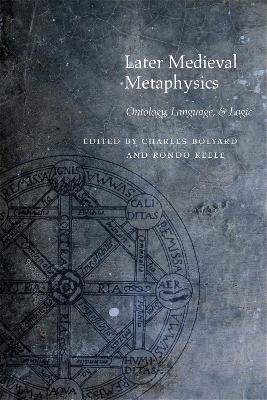
Later Medieval Metaphysics
Ontology, Language, and Logic
Seiten
2013
Fordham University Press (Verlag)
978-0-8232-4472-0 (ISBN)
Fordham University Press (Verlag)
978-0-8232-4472-0 (ISBN)
This multi-author work focuses primarily on 13th and 14th century Latin treatments of the most important metaphysical issues of the day. Though standard ontological topics are covered in detail—e.g., existence, universals, form, and accidents—there is also an emphasis on metaphysics broadly conceived to include epistemology, language, and logic.
The multi-author Essays in Later Mediaeval Metaphysics focuses primarily on 13th and 14th century Latin treatments of some of the most important metaphysical issues as conceived by many of the most important thinkers of the day. Thomas Aquinas, John Duns Scotus, William of Ockham, Walter Chatton, John Buridan, Dietrich of Freiburg, Robert Holcot, Walter Burley, and the 11th century Islamic philosopher Ibn-Sina (Avicenna) are among the figures examined here.
The work begins with standard ontological topics—e.g., the nature of existence, and of metaphysics generally; the status of universals, form, and accidents. Here, a number of questions are considered. What is the proper subject matter of metaphysical speculation? Are essence and existence really distinct in bodies? Furthermore, does the body lose its unifying form at death? Can an accident of a substance exist in separation from that substance? Are universals real, and if so, are they anything more than general concepts?
There is also an emphasis on metaphysics broadly conceived. Thus, discussions of theories of mediaeval logic, epistemology, and language are added to provide a fuller account of the range of ideas included in the later mediaeval worldview. Many questions are raised in this context as well. What are the objects of propositional attitudes? How does Aristotelian logic stand up against modern predicate calculus? Are infinite regress arguments defensible in metaphysical contexts? How are the notions of analogy and equivocation related to the concept of being?
Contributors include scholars of mediaeval philosophy from across North America: Rega Wood (Indiana), Gyula Klima (Fordham), Brian Francis Conolly (Bard College at Simon’s Rock ), Charles Bolyard (James Madison), Martin Tweedale (emeritus, Alberta), Jack Zupko (Winnipeg), Susan Brower-Toland (St. Louis), Rondo Keele (Louisiana Scholars’ College), Terence Parsons (UC-Irvine), and E. J. Ashworth (emeritus, Waterloo).
The multi-author Essays in Later Mediaeval Metaphysics focuses primarily on 13th and 14th century Latin treatments of some of the most important metaphysical issues as conceived by many of the most important thinkers of the day. Thomas Aquinas, John Duns Scotus, William of Ockham, Walter Chatton, John Buridan, Dietrich of Freiburg, Robert Holcot, Walter Burley, and the 11th century Islamic philosopher Ibn-Sina (Avicenna) are among the figures examined here.
The work begins with standard ontological topics—e.g., the nature of existence, and of metaphysics generally; the status of universals, form, and accidents. Here, a number of questions are considered. What is the proper subject matter of metaphysical speculation? Are essence and existence really distinct in bodies? Furthermore, does the body lose its unifying form at death? Can an accident of a substance exist in separation from that substance? Are universals real, and if so, are they anything more than general concepts?
There is also an emphasis on metaphysics broadly conceived. Thus, discussions of theories of mediaeval logic, epistemology, and language are added to provide a fuller account of the range of ideas included in the later mediaeval worldview. Many questions are raised in this context as well. What are the objects of propositional attitudes? How does Aristotelian logic stand up against modern predicate calculus? Are infinite regress arguments defensible in metaphysical contexts? How are the notions of analogy and equivocation related to the concept of being?
Contributors include scholars of mediaeval philosophy from across North America: Rega Wood (Indiana), Gyula Klima (Fordham), Brian Francis Conolly (Bard College at Simon’s Rock ), Charles Bolyard (James Madison), Martin Tweedale (emeritus, Alberta), Jack Zupko (Winnipeg), Susan Brower-Toland (St. Louis), Rondo Keele (Louisiana Scholars’ College), Terence Parsons (UC-Irvine), and E. J. Ashworth (emeritus, Waterloo).
Charles Bolyard is Associate Professor of Philosophy at James Madison University in Harrisonburg, Virginia. Rondo Keele is Associate Professor of Philosophy at the Louisiana Scholars’ College and is the author of Ockham Explained, and numerous articles on William of Ockham and his contemporaries.
| Reihe/Serie | Medieval Philosophy: Texts and Studies |
|---|---|
| Verlagsort | New York |
| Sprache | englisch |
| Maße | 152 x 229 mm |
| Themenwelt | Geisteswissenschaften ► Geschichte |
| Geisteswissenschaften ► Philosophie ► Logik | |
| Geisteswissenschaften ► Philosophie ► Metaphysik / Ontologie | |
| Geisteswissenschaften ► Philosophie ► Philosophie des Mittelalters | |
| Geisteswissenschaften ► Sprach- / Literaturwissenschaft ► Anglistik / Amerikanistik | |
| ISBN-10 | 0-8232-4472-5 / 0823244725 |
| ISBN-13 | 978-0-8232-4472-0 / 9780823244720 |
| Zustand | Neuware |
| Informationen gemäß Produktsicherheitsverordnung (GPSR) | |
| Haben Sie eine Frage zum Produkt? |
Mehr entdecken
aus dem Bereich
aus dem Bereich
ein Gegenentwurf zum kurzfristigen Denken : so werden wir zu den …
Buch | Hardcover (2023)
REDLINE (Verlag)
CHF 27,90
Buch | Softcover (2023)
De Gruyter (Verlag)
CHF 34,90


